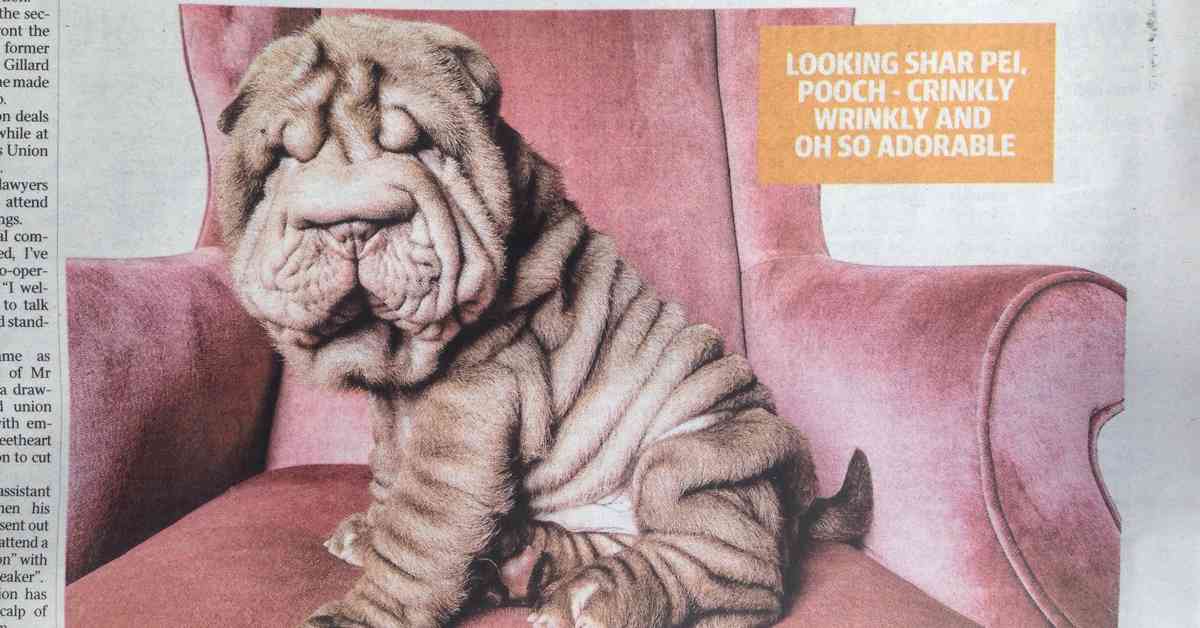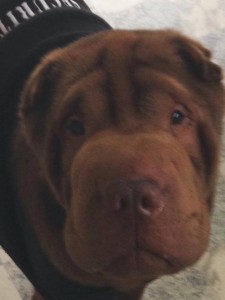Updated November 29, 2020
Here I go again! Another unbearably cute puppy picture in the paper and all I can do is complain!
There’s no question that adorable images of a Shar Pei puppy and a Scottish Fold kitten from the Adelaide Advertiser melt the heart. So why do most vets see something different when we look at these pictures?
Shar Pei Dogs
Shar Peis are one of the most endearing breeds and we always look forward to their visits. Almost everyone who gets to know one falls in love with their unique personality.
Here’s the thing though; we remember every Shar Pei we see and it’s not just because they’re big friendly lumps. It’s also because we see them more often than most other dogs. Let me be clear; most Shar Peis we see have minor problems which should not put anyone off the breed and some have no problems at all.
However, the more folded the skin, the worse it gets. This puppy featured in the newspaper is at the extreme end of the spectrum and I have no doubt he will suffer for his appearance.
Excessive skin folding causes:
- Entropion, where the eyelid skin rolls onto the surface of the eye. This causes damage and pain from the hair rubbing on the cornea. That’s Alfie showing off his new look after surgery.
- Ear infections, caused by the ear canal becoming narrowed and filled with wax
- Skin infections, called fold pyoderma
The folds do reduce with age but never go away. Due to the high rate of problems with some of these dogs, and the ensuing high ongoing costs, there are Shar Pei rescue organisations throughout Australia dealing with unwanted dogs. Alfie is one of those dogs now enjoying a second life.
Consequently, for the newspaper puppy’s breeders and owners I ask only this: bring him to me in five years and allow me to examine him and view his veterinary history. I’ll give my time for free. Unless I’m very mistaken, he will have had multiple vet visits, several corrective surgeries and be facing ongoing health problems unknown to most other dogs. Let me then ask about his quality of life and whether the breeder regrets breeding such extreme features.
If choosing a Shar Pei, our advice is to choose the individuals with the least folded skin. Some of these dogs can live almost normal lives and be just as much fun to know. Or try a Shar Pei rescue if you can!
The same thing applies for the Neapolitan Mastiff, whose skin folds can become disastrous if not managed well (the only one we’ve seen ended up being an RSPCA case). If you are choosing any dog breed, and want to know if there are any issues to be aware of, please ask us!
Scottish Fold Cats
Read an updated guide to Scottish Fold health problems here as well.
Now I will admit I am as susceptible to ‘cute’ as anyone else. Sometimes it’s very hard to remember I have a job to do more than providing cuddles when a puppy or kitten comes to see me. And Scottish Fold kittens are irresistible. But the use of this breed simply because it looks cute is as shallow as it is harmful, and only promotes more breeding of a very unlucky feline.
The problem with Scottish Folds is that they pay a very high price to be cute. The genetic mutation which causes the adorably folded ears is a fundamental and serious cartilage defect called Osteochondrodysplasia. Elsewhere in the body it causes progressive bone deformities and crippling arthritis. In 20 years of treating many Scottish folds, I have never seen one which did not eventually live in significant pain.
If you read any profile about the breed you will read things like:
- They are less active than other cats.
- They like to snooze
- They suit a less active or older owner
- No-one ever says “they are crippled by our human desire for a cute appearance” though maybe they should add this too.
If you google the breed and look at the images (like the one opposite from Wikipedia or the others on this page) you will notice how many pictures show them in unusual cat postures and how few show adults standing or walking.
If you have a Scottish Fold, you are not to blame; you could not know. This information is not being shared by the breeders despite many breed societies internationally refusing to register the breed on welfare grounds. If you look at the Burkes Backyard fact sheet for example, you will not be told the extent of the problem (I have since added a link to this blog).
Remember that animals do not cry out in pain. Read our blog at Myth 1: My pet will cry if they are in pain. If you are concerned by your cat’s comfort and mobility, visit your vet for advice as there is a lot that can be done. Most importantly, raise people’s awareness by sharing this information with anyone thinking of owning a Scottish Fold, and ask them to consider another breed, like the Scottish Shorthair. And perhaps if you are feeling brave, consider talking to the breeders if you meet them.
Here are some recent quotes from world leaders in feline medicine:
“International Cat Care believe that it is simply unethical to continue to breed cats with a genetic mutation that is known to cause significant painful disease – the rationale for breeding these cats was purely human pleasure, as some people believe the folded ears look appealing. This is an unnatural appearance for a cat though, and the underlying genetic defect has far reaching and severe consequences for the health of the cat.”
“As the deformity of the bones continues and the concurrent joint disease progresses, treatment is needed for life in the folded-ear cats…” and “…now that it is recognised that all Scottish Fold cats (whatever their genotype) have joint problems, this breed cannot be considered acceptable as pet or show cat…” plus “…folded-ear cats should never be used for mating.” Takanosu, M., Takanosu, T., Suzuki, H. and Suzuki, K. (2008), Incomplete dominant osteochondrodysplasia in heterozygous Scottish Fold cats. Journal of Small Animal Practice, 49: 197–199.
If you want to read more check out our page on what can go wrong with breeding Great Danes and Maine Coons.
Have something to add? Comments (if open) will appear within 24 hours.
By Andrew Spanner BVSc(Hons) MVetStud, a vet in Adelaide, Australia. Meet his team here.


